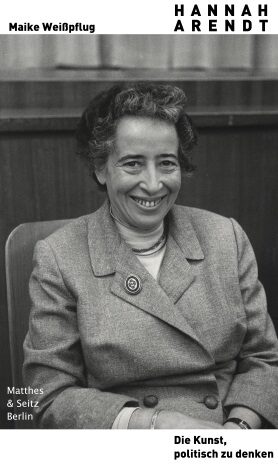Maike Weißpflug
Hannah Arendt. Die Kunst, politisch zu denken
[Hannah Arendt: The Art of Political Thinking]
- Matthes & Seitz Verlag
- Berlin 2019
- ISBN 978-3-95757-721-4
- 320 Pages
- Publisher’s contact details
Sample translations
"Diving for Pearls in the Political History of Ideas"
Now anyone who'd like to might expand on that image of hazy, hasty clouds, fifty-five years after Arendt first described them. In any case, she granted us an occasion to do so. For critics have repeatedly dismissed as hazy and hasty the philosophical work of this theorist of totalitarianism who passed away in 1975. Certainly, Arendt offered plausible, almost feuilletonistic explanations for the genesis of the Holocaust, such as when she wrote with bitter irony about the "banality of evil," referring to Adolf Eichmann not as a monster but a "clown." When asked about the Nazis' intellectual followers (or Mitläufer) in Germany, in her legendary television interview with Günter Gaus, she chortled in the laughter of a heavy smoker. This and similar reactions have earned her not only fame and honor but also resentment and aversion. Old friends like Gershom Scholem accused her of lacking tact.
Arendt herself described her style of thinking with reference to Walter Benjamin: as "diving for pearls" in the political history of ideas. Much in line with such selectivity, her own work has been searched for pearls ever since. In a new book, political scientist Maike Weißpflug has presented Hannah Arendt self-assuredly as a thinker "without guardrails." To the disappointment of many, Arendt did not deliver theories that made systematic claims. To Weißpflug, though, that is precisely an advantage. For something constant can be discerned among Arendt's many reports and research subjects: she steadfastly declined to examine the world from a privileged vantage point. Instead, she was usually suspicious of ultimate rationales. Consequently, Arendt was rather annoyed to be labeled as a philosopher. After all, philosophers are searching for the truth. Arendt relied on the plurality of perspectives. She thus did not become a political thinker of great stature until the era of postmodernism. However, what was her theoretical basis for this approach? Not the grand narratives, but the lesser ones! What people tell each other, the legends they start out with then adapt to their life situations. Politics, to Arendt, is always something that transpires "between human beings."
It's not at all surprising that Weißpflug gradually uncovers how important literature was in how Arendt developed political concepts. Most notably, she drew upon writers such as Franz Kafka, Joseph Conrad, and Bertolt Brecht. According to Arendt, such storytelling originated with the Greeks: "For an understanding of our concept of political freedom, as it originally appeared in the Greek polis, the close connection between the political and the Homeric is of great significance. And not only because Homer eventually became the educator of this polis but because the establishment of the polis was connected most closely to experiences that were in the realm of the Homeric – in accordance with how the Greeks understood themselves." Without Kafka, argues Weißpflug, Arendt might not have been able to describe the novel character of total rule as well as she did in her main theoretical work, The Origins of Totalitarianism.
To Arendt, the Holocaust represented the ultimate culmination of a break with tradition; it thus belonged, in some sense, to the source code of modernity. For modernity breaks with traditions of authority – even breaking with the concept of tradition itself. That creates a vacuum: disorientation, loss of values, flaws in judgment. And a new type of system for ruling others: totalitarianism. Kafka described this break without knowing how imminent the catastrophe was. Yet Arendt sees in him something more: a "Sisyphus of assimilation" who, for example in his fiction The Castle, is writing more or less about the impossibility of remaining a Jew and a citizen at the same time. Arendt imagines a world in which it would be possible to be both a pariah (i.e., socially different) and a citizen (i.e., politically equal) simultaneously.
What Weißpflug extols in Arendt is her attitude of thinking (or Denkhaltung), not the resulting structure of that thinking. Arendt is testing the rhetorical device of empathy for the plight of individuals – while at the same time rejecting the accompanying role of victim. This alone is what allowed her to see a criminal like Eichmann as a "clown." Weißpflug thus writes that "Hannah Arendt's thinking is attractive – precisely because it involves a form of criticism that does not unmask, that does not suspect the world of being false." This further implies that a thinker can make mistakes, as Arendt did in her controversial 1958 essay, "Reflections on Little Rock." In it, she criticized the police protection afforded nine black students who had been prevented by a white mob from entering a school in Arkansas. Weißpflug interprets Arendt's unempathetic (mis-)judgment as an attempt to see enforced social equality in the U.S. not as ending violent discrimination but rather as contributing to it. In this instance, Arendt is once more applying as her standard the history of European Jewry.
"Arendt was writing against the 'liberal cliché' of conformism – against the idea that equality and homogeneity are somehow the same." Yet ultimately those think this way are not proclaiming some philosophical formula for the world from up on high. Arendt's approach is instead one which can be made productive in light of today's perceived breaks in tradition, situated as they are between identity politics and a relentlessly advancing global culture.
Translated by David A. Brenner

By Katharina Teutsch
Katharina Teutsch is a journalist and critic. She writes for newspapers and magazines such as: the Frankfurter Allgemeine Zeitung, Tagesspiegel, die Zeit, PhilosophieMagazin and for Deutschlandradio Kultur.
Publisher's Summary
Since her rediscovery this last few years, it‘s impossible to imagine public debates about freedom, repression and exile without mentioning Hannah Arendt. Yet, not only what she thought is of a highly striking relevance, but also how she thought.
Maike Weißpflug presents a completely unknown Hannah Arendt and portrays her unique way of thinking in this intriguing study. Arendt was much more influenced by writers like Homer, Conrad and Brecht than by any philosopher. By invoking these poets, the political theorist turns against every broad and widespread explanations and theories. The art of political thinking draws its power from the braveness to sit on the fence. To be strident requires the ability to see the world from the perspective of others while still being able to think for oneself.
(Text: Matthes & Seitz Verlag)
